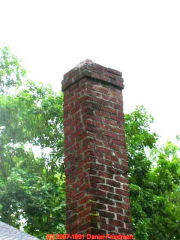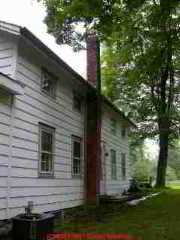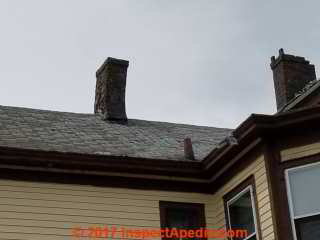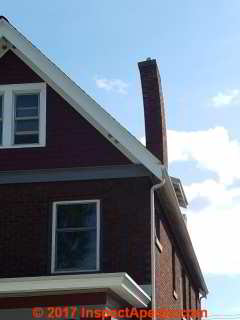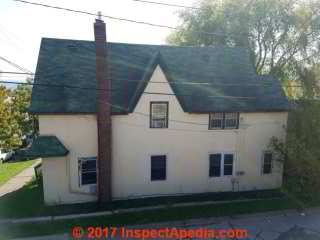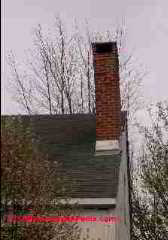 Curved Brick Chimneys
Curved Brick Chimneys
Chimmey Sulfation
- POST a QUESTION or COMMENT about the cause, importance, safety concerns, and repairs for curved chimneys and flues - what is sulphation, what causes a brick chimney to curve or lean?
Curved chimneys & sulphation:
This article describes the cause, inspection, and evaluation of leaning-curved chimneys. Often a brick chimney is visibly curved or leaning above the building roof line.
If the cause is sulphation the chimney curving process is well understood, but further inspection of the chimney flue and the chimney stability are in order since a badly damaged brick chimney may have an unsafe flue or may collapse.
Our page top photo shows a curved brick chimney above the rooftop of a home in Hudson, NY. Look closely at the left edge of the brick chimney to best see this deformation.
InspectAPedia tolerates no conflicts of interest. We have no relationship with advertisers, products, or services discussed at this website.
- Daniel Friedman, Publisher/Editor/Author - See WHO ARE WE?
Curved Brick Chimneys: Definition of Chimney Sulphation
Photos: curved chimneys where the curving is probably due to sulphatin as we will describe and explain here.
These articles on chimneys and chimney safety provide detailed suggestions describing how to perform a thorough visual inspection of chimneys for safety and other defects.
Chimney inspection methods and chimney repair methods are also discussed.
[Click to enlarge any image]
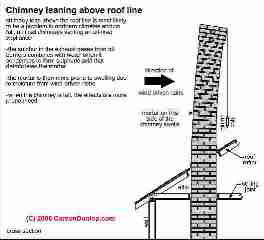
Curves or bending in brick masonry chimneys are common on older homes and may not be evidence of actual chimney settlement or movement.
Below: a curved brick chimney atop a home in Kingston, New York.
Following our leaning chimnney sketch, courtesy of Carson Dunlop Associates, Toronto, we show a quite-curved brick chimney atop an older home in Kingston, NY. The second chimney at right in the photo, has its narrow side facing the direction of principal weather and did not show the same sulphation curving.
A brick chimney may curve away from its most weather-exposed side due to sulphation: a term which describes expanding brick mortar joints caused by the combination of water and sulphur or other minerals.
As Carson Dunlop's sketch points out, curved chimneys seen above the roof line often are found in northern climates where:
- The masonry chimney has an un-lined flue
- The heating fuel was oil or coal containing high levels of sulphur
- The chimney is tall
A curved brick flue may might need repair or replacement but it's not certain. The flue interior needs to be inspected thoroughly for damage and stability.
Below: curved brick chimneys in Duluth Minnesota in 2017. The chimney side that faces west, the direction of more-severe winter storms in the Duluth area shows the characteristic convex curve towards the weather.
Our curved chimney photo below, also on a Duluth home, is quite tall, very curved, and has bracing added. [Click to enlarge any image]
...
Continue reading at CHIMNEY MOVEMENT, ONGOING vs STATIC or select a topic from the closely-related articles below, or see the complete ARTICLE INDEX.
Or see these
Recommended Articles
- BRACING for MASONRY CHIMNEYS
- BRICK CHIMNEY CRACKS & COLLAPSE
- CHIMNEY INSPECTION DIAGNOSIS REPAIR - home
- CHIMNEY COLLAPSE RISKS, REPAIRS
- CHIMNEY CRACK DETECTION & DIAGNOSIS
- CHIMNEY DAMAGE by LEAKS & FROST
- CHIMNEY LEANING, SEPARATION, MOVEMENT
- CHIMNEY INSPECTION from GROUND
- CRACKED CHIMNEYS, MASONRY BLOCK
- CURVED BRICK CHIMNEYS, SULPHATION
Suggested citation for this web page
CURVED BRICK CHIMNEYS, SULPHATION at InspectApedia.com - online encyclopedia of building & environmental inspection, testing, diagnosis, repair, & problem prevention advice.
Or see this
INDEX to RELATED ARTICLES: ARTICLE INDEX to CHIMNEYS & FLUES
Or use the SEARCH BOX found below to Ask a Question or Search InspectApedia
Ask a Question or Search InspectApedia
Questions & answers or comments about the cause, importance, safety concerns, and repairs for curved chimneys and flues - what is sulphation, what causes a brick chimney to curve or lean?.
Try the search box just below, or if you prefer, post a question or comment in the Comments box below and we will respond promptly.
Search the InspectApedia website
Note: appearance of your Comment below may be delayed: if your comment contains an image, photograph, web link, or text that looks to the software as if it might be a web link, your posting will appear after it has been approved by a moderator. Apologies for the delay.
Only one image can be added per comment but you can post as many comments, and therefore images, as you like.
You will not receive a notification when a response to your question has been posted.
Please bookmark this page to make it easy for you to check back for our response.
IF above you see "Comment Form is loading comments..." then COMMENT BOX - countable.ca / bawkbox.com IS NOT WORKING.
In any case you are welcome to send an email directly to us at InspectApedia.com at editor@inspectApedia.com
We'll reply to you directly. Please help us help you by noting, in your email, the URL of the InspectApedia page where you wanted to comment.
Citations & References
In addition to any citations in the article above, a full list is available on request.
- "Top Ten Chimney (and related) Problems Encountered by One Chimney Sweep," Hudson Valley ASHI education seminar, 3 January 2000, contributed by Bob Hansen, ASHI
- Chimney Inspection Checklist, Carson Dunlop, Associates, Toronto, Ontario
- Our recommended books about building & mechanical systems design, inspection, problem diagnosis, and repair, and about indoor environment and IAQ testing, diagnosis, and cleanup are at the InspectAPedia Bookstore. Also see our Book Reviews - InspectAPedia.
- In addition to citations & references found in this article, see the research citations given at the end of the related articles found at our suggested
CONTINUE READING or RECOMMENDED ARTICLES.
- Carson, Dunlop & Associates Ltd., 120 Carlton Street Suite 407, Toronto ON M5A 4K2. Tel: (416) 964-9415 1-800-268-7070 Email: info@carsondunlop.com. Alan Carson is a past president of ASHI, the American Society of Home Inspectors.
Thanks to Alan Carson and Bob Dunlop, for permission for InspectAPedia to use text excerpts from The HOME REFERENCE BOOK - the Encyclopedia of Homes and to use illustrations from The ILLUSTRATED HOME .
Carson Dunlop Associates provides extensive home inspection education and report writing material. In gratitude we provide links to tsome Carson Dunlop Associates products and services.


